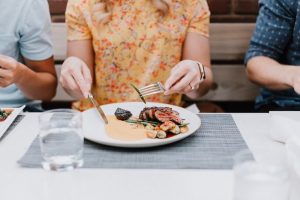
 Have you ever wondered, “Am I an emotional eater?” The truth is most of us, at some point in our lives, will question whether or not we are making the right choices when it comes to food. As we get older, our bodies grow and develop, our metabolism fluctuates—even our tastes evolve. (Do you remember as a child wondering how adults could consume something that tasted awful, like black coffee, and suddenly find yourself to be a plain black coffee drinker once you’ve hit age 30?)
Have you ever wondered, “Am I an emotional eater?” The truth is most of us, at some point in our lives, will question whether or not we are making the right choices when it comes to food. As we get older, our bodies grow and develop, our metabolism fluctuates—even our tastes evolve. (Do you remember as a child wondering how adults could consume something that tasted awful, like black coffee, and suddenly find yourself to be a plain black coffee drinker once you’ve hit age 30?)
Emotional eating as a coping strategy
While eating is intuitive for some people, for others it can be a lifelong battle that requires a lot of thought, energy and decision-making. One of the most difficult things about evaluating our eating habits is that food is ubiquitous: we have to eat in order to survive and because of that food is almost always readily available. Unlike other areas of our life, we can’t press pause and step back to assess the situation. Instead, we have to face our eating behaviors, and for some, addictions, while we continue to eat.
Emotional eating is commonly known to be the act of overeating in order to deal with negative emotions. In short, it’s a maladaptive coping strategy: eating too much in order to make yourself “feel better.” Unfortunately, just like with anything, sometimes it’s not always easy to discover when there’s a problem. For some, grabbing a second donut or an extra slice of pizza might seem like a natural way to deal with stress—just like ordering a martini would be for others.
 Emotional Eating & Therapy
Emotional Eating & Therapy
However, if you’re someone who frequently turns to food for comfort, it may be time to give your eating habits a closer look. For those who are emotionally eating on a regular basis, the risk for developing other eating disorders, such as bulimia and anorexia nervosa, increase. If you are concerned that you may be emotionally eating, a licensed therapist can help you find ways to cope with your stress in a healthier, more effective way.
It is easy to find and schedule an appointment with a Westside therapist specialized in emotional eating behaviors.


